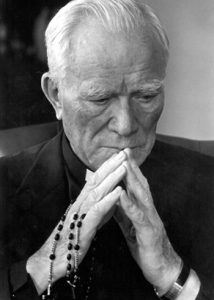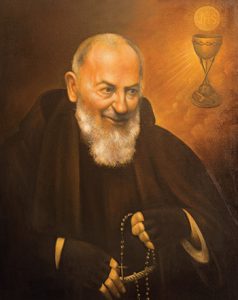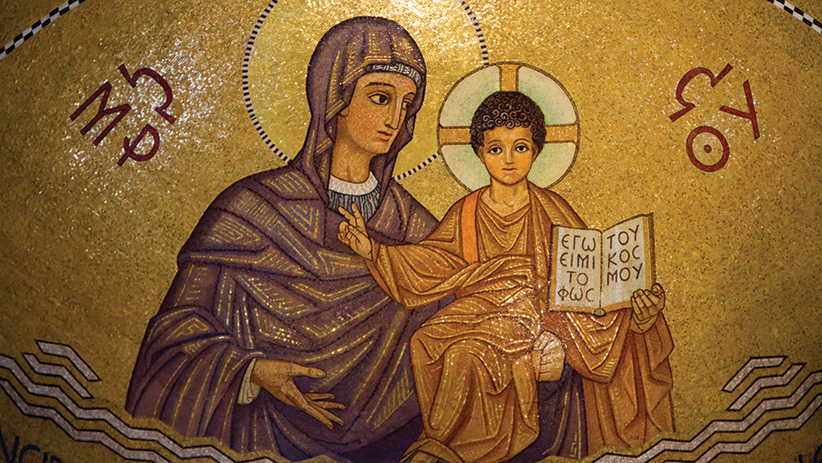It’s easy for Catholics to take the Rosary for granted. We tend to purchase them as souvenirs, or carry them around with us, or even wear them — but we forget the immense power that they have when we actually pray them. And that’s really too bad, because a devotion to the Rosary can be the answer to so many struggles in our 21st-century world.
Our society today faces growing secularism and the disappearance of faith from the public square. We find ourselves confronting a world awash in the spread of evil and terrorism, war and violence. We are plagued by broken families, abounding distractions and a general lack of drive for holiness.
But the Rosary can help. And we know this because Mary herself told us this 100 years ago in Fátima, Portugal, when she appeared six times to three shepherd children once a month from May to October 1917. She told them repeatedly: “Recite the Rosary every day to obtain peace for the world and the end of the war.”
We also know the great value of the Rosary because it has manifested its power time and time again in the lives of men and women of faith throughout history. This, of course, isn’t because the Rosary is magical; it’s because it brings us to Jesus. As the late Cardinal Francis E. George, archbishop of Chicago, said at the conclusion of the Year of the Rosary in 2003: The Rosary “brings us to the heart of the Gospel.” Here’s how.
Break through the Noise
In today’s typical lifestyle, it is easy to become distracted and overwhelmed by all of the “noise.” Technology is constantly demanding our attention. We sit in front of screens and, at the same time, look at smaller screens. We are drawn in by the lure of social-media alerts and use texting as a primary form of communication. We have developed an “always on” or “always available” mentality, and noise no longer knows any boundaries. A Nielson report issued in June 2016 said that Americans, on average, spend more than 10 hours a day looking at some type of screen. It’s easy for us to tell ourselves we’re being productive and that this abundance of “screen time” is necessary, but the reality is that all that noise is damaging to our relationship with God.
This is not just a 21st-century problem, although it has become more pronounced in recent decades. In 1973, Cardinal Albino Luciani — then-archbishop of Venice who would go on to become Pope John Paul I — gave a homily that identified a “crisis of prayer” in the world — adding that part of the reason was due to the fact that “noise has invaded our existence.”
If he thought that life was noisy in 1973, what would Papa Luciani think of 2017?
We also face an abundance of internal noise. We are distracted by interior barriers to prayer that often manifest themselves in the form of pride and self-centeredness. In all of these moments of difficulty, we can turn to the Rosary. The meditative quality of the devotion can help focus us and break through the external noise. At the same time, by praying this simple prayer frequently, faithfully and with humility, we can break down our internal barriers.
In his homily recounted in the book “Why the Rosary, Why Now?”, Cardinal Luciani gives a beautiful and passionate defense of the Rosary — one that is just as relevant in 2017 as it was in 1973.
A Deeper Devotion to the Church
One of the intellectual, spiritual and even media giants of the 20th century was Archbishop Fulton J. Sheen. Archbishop Sheen also had a deep devotion to the Blessed Mother, and he dedicated a book to her called “The World’s First Love, Mary, Mother of God.”
He also spoke much about her in public. In a talk titled “The Woman I Love,” Archbishop Sheen indicated how Mary and the Church were intertwined because “as we discontinue our devotion to the Blessed Mother, there is always a decline in the love of the Church.” Fascinating, isn’t it? The less we pray to and venerate Mary, the less we are connected to the Church. It would follow, then, that the opposite also is true. The more we honor and pray to Mary, especially in her signature prayer of the Rosary, the more our love for and devotion to the Church will increase.
And this is a devotion that we desperately need today. Catholics in the 21st century are experiencing a massive decline of love of the Church. The country is experiencing a massive decline of love of the Church. The country is experiencing a rise in the religiously unaffiliated, or “nones.” It also is facing a large — and growing — gap between the moral teachings of the Church and the evolution of our secular society, which can be seen in recent developments such as the legalization of same-sex marriage in 2015, the growing acceptance of abortion and the growing support for physician-assisted suicide. All are at odds with Church teaching, which means that Church teaching is increasingly at odds with the laws of the land. Part of the problem is widespread lack of faith formation, particularly for many adult, cradle Catholics.
Again, the Rosary can play a huge role in helping individuals grow in their love of and appreciation for the Church. Through developing a greater love of Mary through the Rosary, we come also to a deeper appreciation for her son — and through Him, the Church.
Strengthens Families
Many of you are probably familiar with Father Patrick Peyton, known also as “the Rosary Priest.” He’s the one who coined the phrase, “The family that prays together, stays together.”
But he didn’t just make up the phrase one day; he had been educated and formed on the immense value of the Rosary from birth.

Father Patrick Peyton. CNS photo/Family Theater Productions
Father Peyton was so used to praying the family Rosary every night, for example, that when he left home for the first time to work and was staying with another Catholic family, he was shocked and distressed when they all went to bed without gathering to pray first.
“While I pretended to sleep, I prayed my own Rosary and felt the pangs of homesickness, the bitterness of being among people whose ways were different from my own, whose sense of values failed to measure up to what all my training and experience had told me was normal,” he wrote.
This was clearly a pivotal experience for Father Peyton — one in which he realized he couldn’t take the faith given to him by his family for granted. And this is why, when tragedy struck later in his life, as he was preparing for priesthood, Father Peyton was able to turn to Mary. Through his devotion to her, Father Peyton was miraculously healed from a debilitating disease. And in response, he dedicated his life to spreading devotion to Mary. As he said, “The merit and the glory of every action I would ever perform would be hers and hers alone.”
Father Peyton went on to form the Family Rosary Crusade, making use of radio, film, outdoor signage and more than 260 rallies on six continents to promote family prayer to millions of people.
The excerpt describing this chapter in Father Peyton’s life included in “Why the Rosary, Why Now?” comes from Father Peyton’s biography and chronicles his life-threatening illness and his remarkable recovery — as well as the devotion to Mary and the Rosary that did not forsake him.
An Increase in Christian Discipleship
I think it’s safe to say that each of us, somewhere along the path of life, has come across someone of deep prayer or faith whom we greatly admire and perhaps even envy. I know that I have. This kind of witness is a gift, and it’s a reminder to each of us that we are called to establish our own close, loving relationships with Jesus.
To do this, we must encounter — a word that, in the Pope Francis era, has become a bit of a buzzword, but which is no less vital — Him Encountering Christ means getting to know him intimately, fully and without reservation. It means emptying one’s self so that we may be filled instead with the Holy Spirit.
There are many ways to encounter Christ in our daily lives: through prayer, the sacraments and, of course, the Eucharist. But a less-trod path to encountering Jesus is by developing a relationship first with His mother. After all, it was she who knew Him best, having carried Him in her womb. Mary lived with her eyes fixed on her son, watching over Him and learning from Him. She treasured each moment she had with Him and, as St. Luke’s Gospel says, pondered each in her heart.
The beloved St. John Paul II wrote in Rosarium Virginis Mariae, an apostolic letter on the Rosary, that the devotion is “one of the traditional paths of Christian prayer directed to the contemplation of Christ’s face.” When we pray the Rosary, we meditate on different moments of Jesus’ life, all through the lens of His holy mother. This contemplation leads to a personal encounter, which sets us on the path to Christian discipleship.
There is a startling dearth of Christian discipleship in the world today, mostly because it is not easy to deny yourself, take up your cross and follow Him, as we are instructed to do. As Christian disciples, however, we are called to set aside ego, selfishness and pride, and to instead prioritize others. It’s a countercultural life, but one which Mary and the Rosary can help to achieve.
Brings Peace to the World
One of my favorite Scripture verses comes from St. Paul’s letter to the Christian community at Philippi in which he counsels them on everyday living: “Have no anxiety at all, but in everything, by prayer and petition, with thanksgiving, make your requests known to God. Then the peace of God that surpasses all understanding will guard your hearts and minds in Christ Jesus” (Phil 4:6-7).
Toward the end of 2014, Bishop Doeme had a vision in which Jesus appeared to him and handed him a sword. But when he reached out to take it, the sword turned into a Rosary. Jesus then spoke saying “Boko Haram is gone” three times.

St. Padre Pio
“It was clear that with the Rosary we would be able to expel them,” the bishop said. While this is a remarkable testimony to the power of the Rosary when it comes to fighting evil, it’s not unique.
Many other stories and holy people outline the protections that the Rosary can give, from the Battle of Lepanto, which saved the Christian West from Ottoman invasion, to St. Padre Pio, who called the Rosary “the weapon against the evils of the world today.”
In the included text, written in September 1951, Venerable Pope Pius XII put forth that the Rosary is an antidote to the evils facing the world at the time, such as the nuclear age, communism and the Korean War.
We find ourselves in different, but no less difficult, situations today with almost perpetual war in the Middle East, terrorism at home and abroad, and the persecution of Christians around the globe.
Pope Pius’ words about evil are just as applicable now as they were almost 70 years ago, and the Rosary continues to be the weapon we have to fight it.
Combats Secularism
A recent study performed by the Center for Applied Research in the Apostolate at Georgetown University in Washington, D.C., indicated that 13 was the typical age at which people were leaving the Faith. When asked if they would ever consider returning to the Church, that number raised its ugly head again — with, this time, only 13 percent of young people responding in the affirmative.
Both statistics are disturbing, but they unfortunately present an accurate picture of where we stand today in terms of widespread faith in our culture. We are losing it. In its place, our society is facing a rapid spread of secularism. In an address to U.S. bishops in January 2012, Pope Benedict XVI warned of the pervasiveness of secularism in American society saying, “It is imperative that the entire Catholic community in the United States come to realize the grave threats to the Church’s public moral witness presented by a radical secularism which finds increasing expression in the political and culture spheres.”
But Pope Benedict was hardly the first pope to speak out against secularism. Pope Leo XIII, who reigned from 1878 to 1903, was plagued by politics and the drama of atheist humanism during his time as successor of Peter. In several portions of an astounding 11 encyclicals on the Rosary (Pope Leo was known as the “pope of the Rosary”) — one of which is included in “Why the Rosary, Why Now?” — Pope Leo spoke out about the dangers of a world without belief. His words were strong and prophetic and are just as relatable now as they were then. Pope Leo believed strongly in the power of the Rosary to fight these growing troubles — and he was right. Praying the Rosary can help our world rediscover faith.

photoshooter2015 / Shutterstock.com
Helps Us Become Saints
Each of us is called to sainthood, but this life, as we all know well, is not easy. It requires sacrifice, dedication, heroic virtue and, above all, a close relationship with Christ and a determination to follow his will, come what may. Yet even though it’s not easy, sanctity is what each of us is called to.
This universal call to holiness is expressed in the Second Vatican Council’s Lumen Gentium (Dogmatic Constitution on the Church) — which reminds us that we are called to “be perfect as your heavenly father is perfect.” When wanting to achieve holiness, where else is it better to look than to those men and women who have already done so — that is, the saints themselves.“The saints and blesseds of paradise remind us, as pilgrims on Earth, that prayer, above all, is our sustenance for each day so that we never lose sight of our eternal destiny,” St. John Paul said. “For many of them the Rosary … was the privileged instrument for their daily discourse with the Lord. The Rosary led them to an ever more profound intimacy with Christ and with the Blessed Virgin.”
Among the many saints with a devotion to the Rosary were Pope St. John XXIII, St. Teresa of Calcutta, St. Thérèse of Lisieux, St. Zelie Martin, Blessed John Henry Newman, Pope St. John Paul II and St. Louis de Montfort. Through their example, we find inspiration for ourselves to pray the Rosary more often to draw closer in holiness through Mary and her Son.
Gretchen R. Crowe is editor-in-chief of Our Sunday Visitor and author/editor of “Why the Rosary, Why Now?” (OSV, $14.95).



